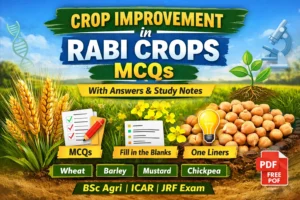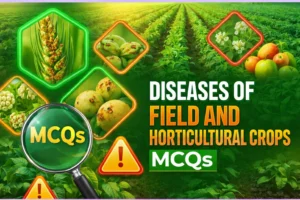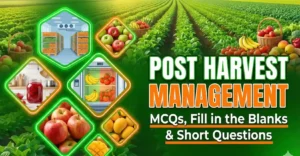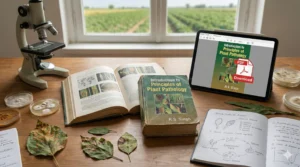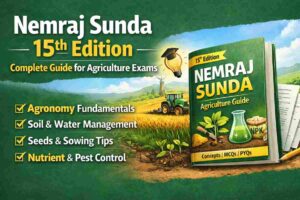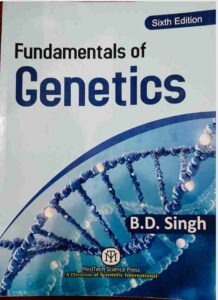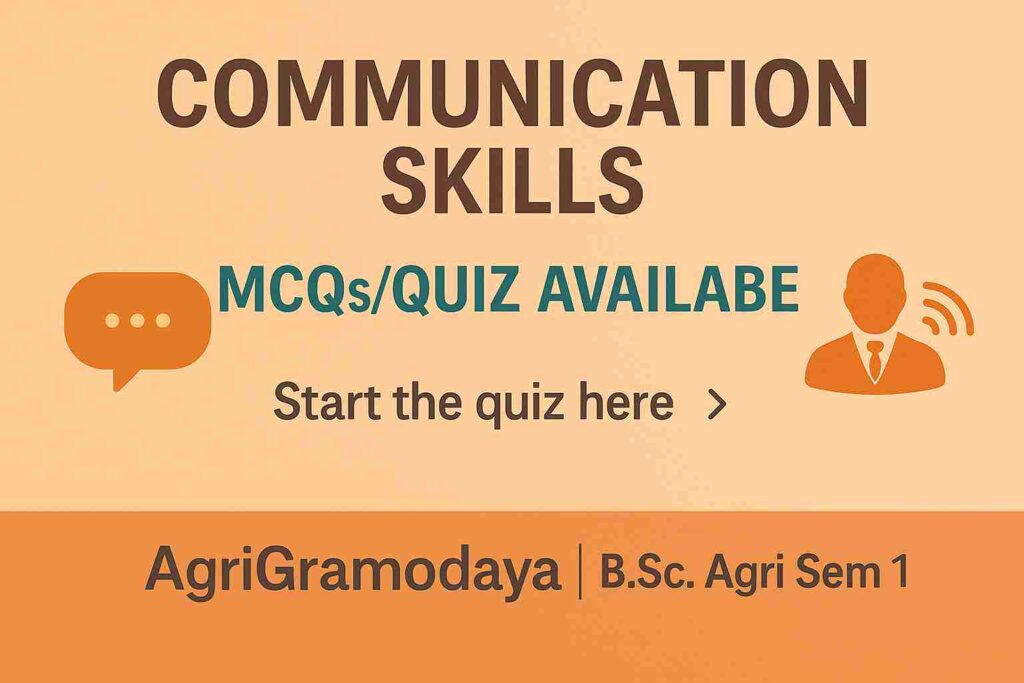
Communication skills and personality development MCQs
Are you preparing for your B.Sc. Agriculture exams or competitive agri exams?
Then mastering communication skills and personality development is not just important—it’s a game-changer.
In this blog, you’ll find carefully selected communication skills and personality development MCQs that cover the full syllabus based on the 6th Dean Committee guidelines.
From basic listening, reading, writing, and speaking skills to grammar, sentence structure, CV writing, and personality traits, we’ve included conceptual, logical, and exam-focused questions.
📘 Let’s dive into the world of communication and personality with MCQs that both teach and test you!
communication skills and personality development mcqs PDF Download
Q.1 Which of the following best defines communication?
a) Transfer of emotions between two machines
b) Exchange of information, ideas, and understanding
c) Controlling others through language
d) Only using words to speak
📝 Additional Information
Communication is the two-way process where people share ideas, information, or feelings and develop mutual understanding.
It can be:
Spoken, written, or non-verbal
Formal or informal
👉 Effective communication doesn’t just pass information — it ensures the other person understands it correctly.
Q.2 Which of these is a major component of the communication process?
a) Weather
b) Channel
c) Taste
d) Habit
📝 Additional Information
The main elements of communication are:
Sender – initiates the message
Message – the content
Channel – the medium (voice, letter, phone, etc.)
Receiver – who gets the message
Feedback – response to the message
👉 Channel is important because it decides how the message travels.
Q.3 Which one is an example of non-verbal communication?
a) Writing a letter
b) Giving a speech
c) Sending an email
d) Nodding the head
📝 Additional Information
Verbal communication = using words (spoken or written)
Non-verbal communication = body language, facial expressions, gestures, posture
👉 Nodding = non-verbal way to show agreement or understanding, without saying anything.
Q.4 Which of the following is a common barrier to communication?
a) Active listening
b) Clear language
c) Cultural difference
d) Eye contact
📝 Additional Information
Barriers are anything that block or distort communication.
They can be:
Linguistic – wrong language or complex words
Psychological – stress, fear, ego
Cultural – different beliefs, traditions
Physical – noise, distance
👉 Cultural difference = major cause of misunderstanding, especially in diverse settings.
Q.5 Which model of communication includes sender, message, and receiver in a straight path?
a) Helical Model
b) Interactive Model
c) Linear Model
d) Transactional Model
📝 Additional Information
Linear Model is the simplest form of communication:
Sender → Message → Receiver
There is no feedback in this model — once the message is sent, the process ends.
👉 Useful in lectures, announcements, or one-way instructions.
Q.6 Which of the following is considered the most important part of effective listening?
a) Interrupting frequently
b) Thinking about your own reply
c) Paying full attention to the speaker
d) Judging the speaker’s grammar
📝 Additional Information
Effective listening means:
Being fully present mentally
Not interrupting
Showing interest through eye contact and gestures
This helps in clear understanding and building trust in communication.
👉 Listening is an active process, not just hearing.
Q.7 Which skill is most important for delivering an effective speech?
a) Reading silently
b) Writing detailed reports
c) Speaking clearly and confidently
d) Listening without response
📝 Additional Information
Good speaking skills involve:
Clarity (words must be understood)
Confidence (voice, posture, expression)
Structure (intro, body, conclusion)
👉 A clear and confident speaker can influence, inspire, and inform.
Q.8 Which of the following is not a part of reading skills?
a) Scanning
b) Skimming
c) Pronunciation
d) Comprehension
📝 Additional Information
Reading skills include:
Scanning – looking for specific info
Skimming – reading quickly for the main idea
Comprehension – understanding the message
Pronunciation is part of speaking, not reading.
👉 Reading is a silent mental process to understand content.
Q.9 What is the main objective of precis writing?
a) To criticize the author
b) To write creatively
c) To summarize the passage in brief
d) To increase word count
📝 Additional Information
Precis writing means:
Reducing a long passage to its main points
Maintaining original meaning
Writing in your own words in 1/3 of original length
👉 It helps improve writing clarity, understanding, and summarizing ability.
Q.10 Choose the correct analogy: “Word : Sentence :: Page : ?”
a) Chapter
b) Letter
c) Paragraph
d) Book
📝 Additional Information
Analogy is a relationship-based comparison.
Words make a sentence
Pages make a book
👉 So the correct pair is:
Word : Sentence = Page : Book
Which of the following should NOT be included in a professional CV?
a) Career objective
b) Educational background
c) Personal opinions and political views
d) Skills and achievements
📝 Additional Information
A CV (Curriculum Vitae) should include:
Career objective
Academic qualifications
Experience & skills
Contact details
👉 Personal opinions, religion, or political views are irrelevant and may create bias, so should be avoided.
Q.12 Which of the following is a correctly structured sentence?
a) Running quickly the boy won the race.
b) The boy quickly running won the race.
c) The boy won the race running quickly.
d) The boy, running quickly, won the race
📝 Additional Information
A modifier describes a word or phrase and should be placed near what it modifies.
In option (d), “running quickly” correctly describes the boy.
👉 Clear sentence structure avoids confusion and improves readability.
Q.13. Which of the following is an example of the possessive case?
a) He ran fast.
b) The dog barked loudly.
c) That is Ramesh’s book.
d) She is taller than I.
📝 Additional Information
Subjective case: I, he, she
Objective case: me, him, her
Possessive case: my, your, his, Ramesh’s
👉 “Ramesh’s book” shows ownership, so it’s possessive case.
Q.14 Identify the correctly used noun and article:
aa) She has an unique talent.
b) He is an honest man.
c) It is a hour left.
d) I saw a elephant
📝 Additional Information
Use “an” before vowel sounds, not just vowels.
“Honest” starts with a silent ‘h’ → sounds like “onest” → an honest
“A hour” is wrong; correct: an hour
👉 Article selection depends on sound, not spelling.
Q.15 Which pronoun correctly completes the sentence: “This is the girl ___ won the quiz.”
a) which
b) whom
c) who
d) whose
📝 Additional Information
“Who” = subject (the one who does the action)
“Whom” = object
“Whose” = possession
“Which” = for things/animals (not people)
👉 Here, “the girl who won” – she is the subject, so we use who.
Q.16 Choose the correct sentence with subject-verb agreement:
a) The list of items are on the table.
b) The students in the class has notebooks.
c) A bouquet of flowers was placed on the table.
d) Neither of the boys have arrived.
📝 Additional Information
“Bouquet” is the subject, not “flowers” → it’s singular → needs “was”
In subject-verb agreement, always find the main subject, not the nearest noun.
👉 So, “A bouquet of flowers was…” is correct.
Q.17 Which sentence is in the past perfect tense?
a) She writes a letter.
b) She will write a letter.
c) She had written a letter.
d) She is writing a letter.
📝 Additional Information
Past Perfect = “had” + past participle (written, gone, seen, etc.)
Used to show that an action was completed before another past action.
👉 “She had written” = past perfect.
Q.18 Identify the sentence in passive voice:
a) They are watching a movie.
b) A movie is being watched by them.
c) Watch the movie carefully.
d) They watched movies every Friday.
📝 Additional Information
In passive voice, the object becomes subject, and the verb form includes “be + past participle.”
Active: They are watching a movie.
Passive: A movie is being watched by them.
👉 Passive is used when the doer is less important or unknown.
Q.19 Which of the following is a sentence fault?
a) She likes mangoes, and she eats them often.
b) Because she likes mangoes.
c) She eats mangoes regularly.
d) Mangoes are her favorite fruit.
📝 Additional Information
Option (b) is a sentence fragment — it leaves the thought incomplete.
“Because she likes mangoes” → makes the reader expect more.
👉 Every sentence must express a complete thought.
Upcoming agriculture exams 2025
Q.20 Which sentence shows correct use of verb tense and voice?
a) The song was sings by her.
b) She will singing in the concert.
c) She has been singing beautifully.
d) She are a great singer.
📝 Additional Information
“Has been singing” = Present perfect continuous → correct for an action continuing over time
Other options either have incorrect tense or subject-verb mismatch
👉 Option (c) is grammatically sound and natural in use.
Q.21 Which sentence correctly uses mood in grammar?
a) Go to the store and buy milk.
b) He went to the store milk.
c) Store is where he go.
d) Gone to store he has.
📝 Additional Information
There are three moods in grammar:
Indicative – states facts (e.g., She goes to school.)
Imperative – gives commands (e.g., Go to the store.)
Subjunctive – hypothetical/wish (e.g., If I were rich…)
👉 “Go to the store…” is imperative mood, used for giving commands or instructions.
Q.22 Which of the following is the best example of an effective sentence?
a) Because she liked the show.
b) The students after the bell rang.
c) The farmer harvested the crop before the rain.
d) Went to the field he.
📝 Additional Information
An effective sentence:
Expresses a complete idea
Is grammatically correct
Has correct word order
Option (c) is a complete, clear and properly ordered sentence with subject + verb + object.
Q.23 Which is an example of a misplaced modifier?
a) She only eats rice for dinner.
b) Only she eats rice for dinner.
c) She eats only rice for dinner.
d) She eats rice only for dinner.
📝 Additional Information
In sentence (a), “only” is misplaced — it should be placed next to the word it modifies.
Saying “She only eats rice” may mean she doesn’t chew or cook it — just eats!
👉 Better would be: “She eats only rice…” to clarify meaning.
Q.24 Which sentence shows incorrect subject-verb agreement?
a) She goes to school every day.
a) She goes to school every day.
b) They plays football on Sunday.
c) He reads newspaper in the morning.
d) We enjoy long walks in winter.c) He reads newspaper in the morning.
d) We enjoy long walks in winter.
📝 Additional Information
Subject-verb must agree in number:
“They” = plural → should take “play” not “plays”
Correct sentence: “They play football on Sunday.”
👉 Option (b) mismatches singular verb with plural subject.
Q.25 Which of the following shows proper use of tense, agreement, and structure?
a) She have studied well and score good.
b) She had studied well and scored good.
c) She had study well and score good.
d) She had studied well and scored well.
📝 Additional Information
“Had studied” and “scored” = past perfect & past tense
“Well” = adverb (modifies verb correctly)
“Good” is adjective; so “scored well” is grammatically correct.
👉 Sentence (d) maintains correct tense + agreement + adverb usage
Q.26 Which of the following is an example of a sentence fragment?
a) While she was walking.
b) She walked through the field.
c) He reads every day.
d) They are studying now.
📝 Additional Information
A sentence fragment is an incomplete sentence that doesn’t express a full idea.
“While she was walking…” feels incomplete — what happened while she was walking?
👉 Always ensure sentences have a subject, verb, and a complete thought.
Q.27 What type of sentence error is in: “Everyone have finished their work.”?
a) Fragment
b) Pronoun shift
c) Subject-verb agreement error
d) Run-on sentence
📝 Additional Information
“Everyone” is a singular subject → should be “has finished” not “have”.
Correct: “Everyone has finished their work.”
👉 Words like everyone, each, somebody take singular verbs.
Q.28 Which is an example of a compound sentence?
a) He went to the market and bought vegetables.
b) The boy ran.
c) Though it rained, we went out.
d) He reads and she writes.
📝 Additional Information
A compound sentence has two independent clauses joined by a coordinating conjunction (and, but, or, so…).
“He reads” = one clause
“She writes” = another
👉 Together: “He reads and she writes” → compound sentence
Q.29 Which sentence avoids redundancy?
a) She repeated the same thing again.
b) He wrote a short summary of the article.
c) The final conclusion was made.
d) She returned back to the village.
📝 Additional Information
“Repeated again”, “final conclusion”, “returned back” → all are redundant (repeating the same meaning)
“Short summary” is acceptable since summaries are often brief by nature, but here it’s not excessive.
👉 Use concise, meaningful words to avoid redundancy.
Q.30 Which of the following skills is used when you reduce a long paragraph into a few key points?
a) Reading aloud
b) précis writing
c) Listening attentively
d) Speaking fluently
📝 Additional Information
Precis writing = writing a brief version of a longer passage using your own words without losing the main meaning.
👉 It improves:
Comprehension
Writing clarity
Summarizing skills
This is important for students, researchers, and professionals alike.
Download most common agricultural exams syllabus.
Latest Syllabus | Download Here |
IBPS Agriculture Filed Officer | |
NABARD GRADE A | |
Food Corporation of India (FCI) | |
RAEO | |
RHEO | |
Food Inspector | |
IFFCO AGT | |
MP PAT | |
UPSSSC AGTA |
Download other BSC agriculture subjects MCQs.
Conclusion: communication skills and Personality Development MCQs with Explanations for BSc Agriculture"
Well done, future agri professionals! 🌱
By solving these communication skills and personality development MCQs, you’ve taken one big step toward improving not just your academic scores — but also your confidence and personal growth.
🧠 You revised:
Grammar, sentence correction, and vocabulary
Listening, reading, speaking, and writing
Personality traits, leadership tone, and CV writing
Practical tips to avoid common errors
These questions weren’t just about marks—they were about real-life communication mastery.
👉 If you found this blog useful, do share it with your agri friends and classmates—and don’t forget to check out our other MCQ sets for B.Sc. Agriculture subjects only on AgriGramodaya.com 🚜
Keep learning. Keep growing. And remember — great communication is the first step to great leadership.
Topic requests? Comment below or reach out via our contact page — we’d love to hear from you!
Click to Join Our Free WhatsApp Group and YouTube for Agriculture Updates!
Get daily updates, free study material, and the latest schemes, and connect with other agriculture students and farmers.
Latest post
👉Top 100 Crop Improvement in Rabi Crops MCQs + Fill in Blanks + One Liners (Exam Special)
Crop improvement in rabi crops MCQs is one of the...
Read More👉 Diseases of Field and Horticultural Crops MCQs True/False, fill in the blanks (With Answers for BSc Agriculture)
Diseases of field and horticultural crops are one of the...
Read More80+ Post Harvest Management MCQs, Fill in the Blanks & Short Questions (Exam-Oriented)
Post harvest management is one of the most important units...
Read MoreR.S. Singh Plant Diseases Book PDF: The “Gift” for Plant Pathology Students
Table of Contents If you are a BSc Agriculture student,...
Read MoreNemraj Sunda 15th Edition PDF Download Free : Is It Still the Ultimate Guide for Agri-Exams?
Table of Contents If you have ever stepped into an...
Read MoreFundamentals of Genetics by B.D. Singh Book PDF: A Comprehensive Review & Why It’s a Must-Have for Agri Students
Let’s be honest for a second—when most of us join...
Read More🙋♂️ About the Author
Khumesh, a BSc Agriculture student and founder of AgriGramodaya.com, is on a mission to make communication skills and personality development MCQs the easiest and most accessible subject for students across India.
Having personally faced the challenge of finding clear, structured, and visual content for horticulture, he decided to build a complete one-page resource, breaking down the full syllabus into simple parts — supported by PPTs, summary notes, previous-year MCQs, and exam-oriented insights.
Every part of this subject is designed to help students from zero to advanced level, whether you’re preparing for semester exams or agriculture job exams.
📚 Learn visually. Revise smartly. Succeed confidently — only on AgriGramodaya.

